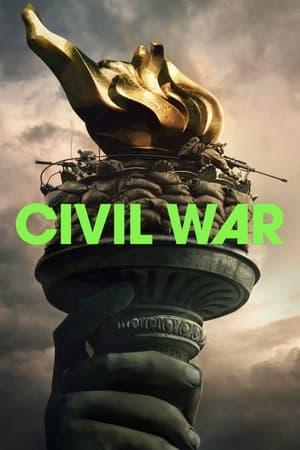At the climax of one of the (rare) action sequences of Civil war, to create pathos, or underline it, depending on your point of view, Alex Garland, blasts hip hop by De La Soul.
Following are shots of the survivors peppered with hair blowing in the wind and slow motion as if it were raining; something that, if some other director (for example Snyder) had done it, would be the subject of justified and easy irony.
But let's proceed in order.
As the title itself kindly warns us, the United States is torn apart by a civil war.
Texas, California and Florida have declared secession while the President, in his third term, is barricaded in Washington.
How we got there This? How long has the war been going on? Garland does not provide any explanation, he puts us in media res, perhaps with the intention of making his narrative universal; in the meantime, in fact, there was the assault on the Capitol on January 6, 2021, so why waste so much?
The photographer Lee Smith (Kirsten Dunst) and her colleague Joel (Wagner Moura) decide to try to reach the White House to interview the President and they are joined by the elderly Sammy (Stephen McKinley Henderson) and the young Jessie (Cailee Spaeny).
The plot of Civil war is reduced to bone and resembles more than anything else a sort of macabre video game with multiple levels of difficulty.
The characters then, in fact, did not arrive.
There is the famous photojournalist apparently insensitive to horrors after having seen so many, the elderly colleague who doesn't want to let go, Joel who lives in a sort of state of continuous exhilaration due to adrenaline and Jessie, apparently young and naive who understands after a few seconds that in reality she is the ready to do anything to establish herself as a photographer.
There is no psychological in-depth analysis and indeed, if you want to know, apart from Sammy, it's not clear who the others work for given that the country is in flames.
The scenario is also confusing, as it should be in a war.
Just think of the opening of the film with soldiers guarding a truck containing water; we don't know which faction they belong to, nor what is really happening.
The situation doesn't improve along the way. There's a sniper who shoots anyone who tries to cross the street in front of his house, a group of people guarding a petrol station who have just tortured two guys mostly, it seems, to get revenge for the fact that they didn't say hello to them in high school.
And again, a city where nothing seems to have changed but which is full of armed people on the roofs and finally a group of psychopathic nationalist soldiers, including Jesse Plemons, who pile corpses in a mass grave.<5 >
The intent is clear.
Garland wants to give us back the devastation and confusion that accompany every war, without taking part.
At the same time his film seems to want to be a reflection on the moral limits of documenting the horrors of the world.
Civil war seems to want to ask the viewer questions but, in reality, it limits itself to shouting easy, banal and even rhetorical answers.< 5>
The director's gaze is of a superficiality that leads to the immoral and he would like to find a contrast in the black and white photos taken by the various protagonists.
What remains instead is a banal journey between territories in which now only traces of what happened remain.
It seems to be in any episode of The walking dead rather than in a film about a civil war on American soil.
Garland obsessively seeks the beautiful image and his seems like a film produced following the algorithm of any platform more than anything else.
The result is a glossy cinema that never manages to produce images that shake the spectator.
The low-cost cinema of Romero's Diary of the dead naturally comes to mind, which it is one of the references of Civil war, which, armed with a video camera, raised questions about media overexposure while showing how, through editing, it was possible to change the narrative of the facts.
The times have changed and today we have to deal with a cinema that seems incapable of elaborating a reflection, both from an aesthetic and content point of view.
All it takes is a couple of beautiful images, captivating music and a show suitable for and consumption of lazy eyes.
There is no need to question ourselves, since there is news that offers a connection with reality and allows a film to be passed off as political that we should instead think about.
< 0>After all, this is not arthouse genre cinema, let's be clear.This is a disposable blockbuster, yet another fast food.
At least this time there was some critical voices who have underlined its inconsistency.
For the rest, today a film like Civil war is enough and moves forward.
And it doesn't matter about plot holes, of the didactic dialogues that continually explain and underline the two concepts present, the important thing is to go home convinced that you have witnessed a "committed" cinema without it having raised a single doubt or a single question.
The reflection remains on paper, there was Capitol Hill anyway and the American elections are upon us, what else do you want?
EMILIANO BAGLIO




